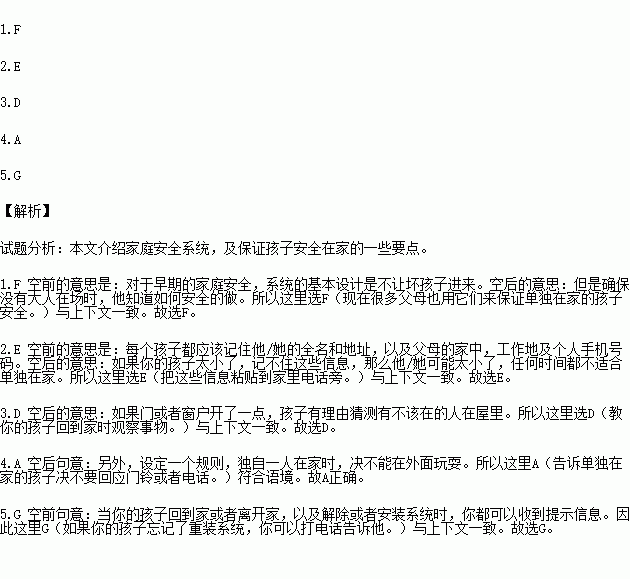题目内容
根据短文内容,从短文后的选项中选出能填入空白处的最佳选项。选项中有两项为多余选项。
Nowadays, more and more parents are using a new technology, home security systems, to keep an eye on their “home-alone” children. In the early days of home security, the systems were basically designed just to keep the bad guys out. ___1.___ But be sure, when no adult is present, he or she knows how to do so safely.
Every child should memorize his or her own full name and address, and home, work and cellphone numbers of each parent. ___2.___If your child is too young to memorize the information, he or she may be too young to be home alone — for any time.
____3._____If a door or window is slightly open, the child has any reason to suspect someone has been in the house that shouldn’t be, have him or her call you, then wait at the nearby home of a neighbour who’s agreed to act as a safe house...
____4.__Besides, set a rule that he or she must never play outside the house when no one else is at home.
Be sure your child knows how to disarm (解除) and arm your home security system. Program your control panel (控制板) to give you a message when your child enters or leaves the house, and arms or disarms the system. __5.____
If you want to learn more about home security systems that can help parents protect their “home-alone” children, you can visit www.ProtectAmerica.com.
A. Warn your home-alone child never to answer the doorbell or telephone.
B. You and your child should work together to use the home security systems.
C. At present, the systems are only intended for home-alone children.
D. Teach your child to observe things when returning to the house.
E. Also keep this information posted next to the phone at home.
F. Now, many parents are also using them to make their home-alone children safe.
G. If your child forgets to rearm the system, you can call him or her with a personal reminder.
 小学课时特训系列答案
小学课时特训系列答案
